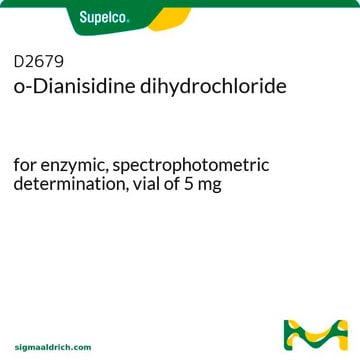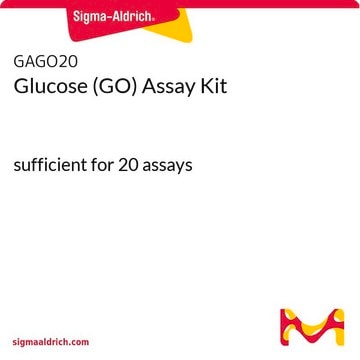F5803
o-Dianisidine dihydrochloride
Suitable for use in glucose determination
Synonym(s):
3,3′-Dimethoxybenzidine dihydrochloride, Fast Blue B
About This Item
Recommended Products
form
crystalline
pH range
6.95-7.05
mp
268 °C
solubility
water: 2.5 mg/mL, colorless
application(s)
diagnostic assay manufacturing
hematology
histology
storage temp.
2-8°C
SMILES string
Cl.Cl.COc1cc(ccc1N)-c2ccc(N)c(OC)c2
InChI
1S/C14H16N2O2.2ClH/c1-17-13-7-9(3-5-11(13)15)10-4-6-12(16)14(8-10)18-2;;/h3-8H,15-16H2,1-2H3;2*1H
InChI key
UXTIAFYTYOEQHV-UHFFFAOYSA-N
Looking for similar products? Visit Product Comparison Guide
General description
Specificity
Application
- As substrate for the determination of serum ceruloplasmin from its oxidase activity.
- Determination of total antioxidant response (TAR) against potent free radical reactions by a novel, colorimetric and fully automated method.
- As colorimetric indicator for the simultaneous semi-quantitative estimation of glucose, lactate and uric acid on paper-based microfluidic devices (microPAD).
- Myeloperoxidase activity assay.
Warning
enzyme
standard
Signal Word
Danger
Hazard Statements
Precautionary Statements
Hazard Classifications
Acute Tox. 4 Oral - Carc. 1B - Eye Dam. 1 - Skin Corr. 1
Storage Class Code
6.1C - Combustible acute toxic Cat.3 / toxic compounds or compounds which causing chronic effects
WGK
WGK 3
Flash Point(F)
Not applicable
Flash Point(C)
Not applicable
Personal Protective Equipment
Certificates of Analysis (COA)
Search for Certificates of Analysis (COA) by entering the products Lot/Batch Number. Lot and Batch Numbers can be found on a product’s label following the words ‘Lot’ or ‘Batch’.
Already Own This Product?
Find documentation for the products that you have recently purchased in the Document Library.
Customers Also Viewed
Our team of scientists has experience in all areas of research including Life Science, Material Science, Chemical Synthesis, Chromatography, Analytical and many others.
Contact Technical Service












